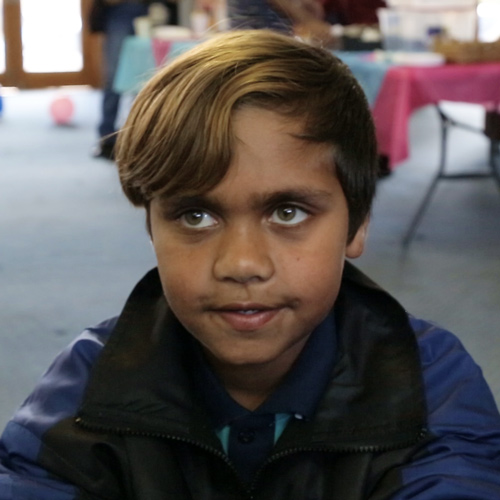Sista Speak and Bro Speak in Moree

Moree has come a long way since Charles Perkins and the Freedom Riders from Sydney University paid the town a visit in 1965, making history when they took a group of indigenous children to swim at the local pool- which they were banned from doing at the time.
51 years on, the town is still faced with its share of social issues – a well-documented ice epidemic, one of the highest crime rates in the state, and children and teenagers at a high risk of getting caught up in a cycle of welfare dependency and substance abuse.
But despite the odds, there are still members of the community who are trying to break that cycle. Moree Secondary College are the recipients of this year’s Mental Health Matters Award for their SistaSpeak and BroSpeak Cultural and Mentoring Programs, in the category of Aboriginal Social and Emotional Wellbeing.
SistaSpeak and BroSpeak are 10-week programs for indigenous students (SistaSpeak for girls, BroSpeak for boys) run during the school term. The programs consist of guest presenters coming in and talking about various social issues impacting their lives, as well as teaching them about their culture. At the end of the program, they hold a formal graduation ceremony for the students who have completed it.
Peter Sheargold, who is the principal at Moree Secondary College, says he is “really chuffed” about the award and that the programs themselves are “fantastic.”
“A lot of the things are social issues, but a lot of it is cultural and trying to give kids health and resilience and all those things that come with knowing who they are and what their mob is and how the people who’d gone before them lived, to be very proud young Kamilaroi people.”
The SistaSpeak and BroSpeak programs are run in several schools across NSW, but what makes Moree Secondary College’s programs unique is the way it is tailored to the local community, with a focus on real-life issues that relate to the students’ everyday lives.
“The original program is based on career development, self-esteem, that type of stuff, but I’ve changed it to look at social issues,” says Janine French, the school’s Senior Leader for Community Engagement who is in charge of both programs.
“There’s a high drug and alcohol abuse rate in Moree, there’s a high domestic violence rate, so I picked those social issues and covered a different topic every week. We wanted to engage the community as much as we could so what we did was get service providers around a whole range of different topics for example mental health, drugs and alcohol, domestic violence, body image, healthier choices in nutrition, grief and loss.”
“The other component was an Aboriginal cultural activity – art,dance, or something like that. We totally changed it from what the standard program was, so hearing that we won the award was certainly a big surprise and a great achievement for all of our staff and students involved.”
In the most recent program, which completed in Term 2, there were 16 boys enrolled in BroSpeak and 14 girls in SistaSpeak. The programs both had attendance rates of over 80%, a figure that is higher than overall attendance across the school which is currently about 77%.
“We didn’t just target it at the good kids, we strategically selected about five kids from every year group…some might have been good at sport or academic, some were really low attenders, some were having behaviour problems,” says Janine.
“It was using the good kids to be like role models for the ones who weren’t coming as much and using the program as an incentive to make kids want to attend school more. For example we got them all a jacket each, they designed the logos and the jackets but to be able to qualify to even get a jacket they had to come for at least five lessons. If they didn’t come for the lessons, they wouldn’t get a jacket. Some of them had really poor attendance and then their attendance just went right up, others were getting suspended, constantly in trouble, their behaviour improved and they actually wanted to come to school more. ”
Even though the programs only run for ten weeks, Janine says that she started seeing changes in the students’ attitudes as early as five weeks in.
“In the first couple of weeks I’d get them to take turns introducing themselves, saying something positive, giving another girl a compliment, or even just thanking the guest speaker, they were all too shy to do that in the first few weeks. By halfway through the program they all wanted to do it, like stand up and talk and say the thank yous and give each other compliments, that was all in a matter of weeks.”
More importantly, Janine says that over time the students started feeling comfortable enough around herself and the other facilitators to start confiding in them about personal issues they were facing.
“If they had a problem they would then come up to myself or one of the other facilitators outside of the sessions and say, ‘I’m not feeling so well, can I talk to you about some issues?’” she said.
“One girl came up and said ‘I haven’t really handled the fact that my mum died when I was young, can you please help me get into some counselling now?’ They were getting the confidence to come and approach us whenever they needed help or assistance in anything.”
While the SistaSpeak program has been running for a few years, the BroSpeak program just started this year. The programs have received “universally positive” feedback from everyone involved, from the students themselves to parents, teachers and the presenters and will continue on into Term 3 this year.
Newsletter
Stay up to date
Sign up to our Mind Reader newsletter for monthly mental health news, information and updates.